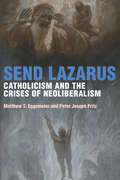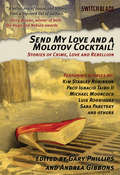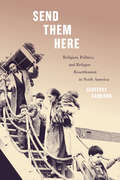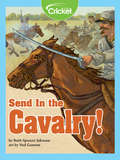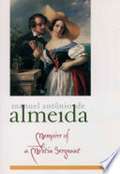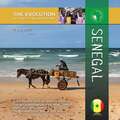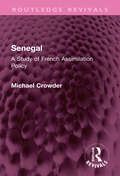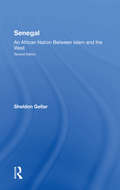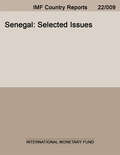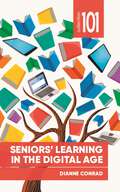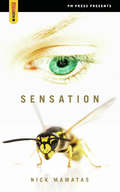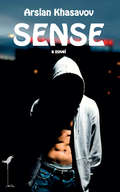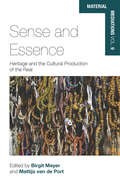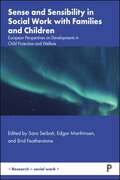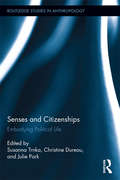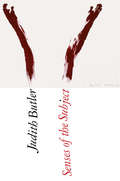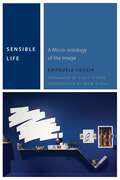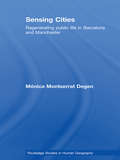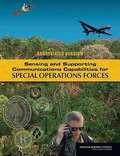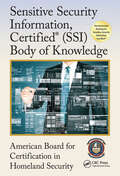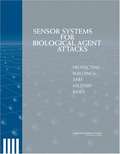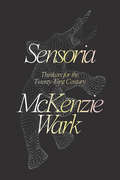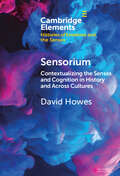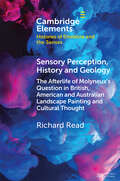- Table View
- List View
Send Lazarus: Catholicism and the Crises of Neoliberalism (Catholic Practice in North America)
by Matthew T. Eggemeier Peter Joseph FritzToday’s regnant global economic and cultural system, neoliberal capitalism, demands that life be led as a series of sacrifices to the market. Send Lazarus’s theological critique wends its way through four neoliberal crises: environmental destruction, slum proliferation, mass incarceration, and mass deportation, all while plumbing the sacrificial and racist depths of neoliberalism.
Send My Love and a Molotov Cocktail!: Stories of Crime, Love and Rebellion (Switchblade)
by Gary Phillips Andrea GibbonsAn incendiary mixture of genres and voices, this collection of short stories compiles a unique set of work that revolves around riots, revolts, and revolution. From the turbulent days of unionism in the streets of New York City during the Great Depression to a group of old women who meet at their local café to plan a radical act that will change the world forever, these original and once out-of-print stories capture the various ways people rise up to challenge the status quo and change up the relationships of power. Ideal for any fan of noir, science fiction, and revolution and mayhem, this collection includes works from Sara Paretsky, Paco Taibo II, Cory Doctorow, Kim Stanley Robinson, and Summer Brenner.
Send Them Here: Religion, Politics, and Refugee Resettlement in North America (McGill-Queen's Refugee and Forced Migration Studies #5)
by Geoffrey CameronThe United States and Canada have historically accepted approximately three-quarters of resettled refugees, leading the world in this key aspect of global refugee protection. Between 1945 and 1980, both countries transformed their previous policies of refugee deterrence into expansive resettlement programs. Explanations for this shift have typically focused on Cold War foreign policy, but there was a domestic force that propelled the rise of resettlement: religious groups.In Send Them Here Geoffrey Cameron explains the genesis and development of refugee resettlement policy in North America through the lens of the essential role played by faith-based organizations. Catholic, Protestant, and Jewish groups led advocacy efforts for refugees after the Second World War, and they cooperated with each other and their respective governments to implement the first formal resettlement programs. Those policy frameworks laid the foundation for diverging policy trajectories in each country, leading ultimately to private sponsorship in Canada and the voluntary agency program in the United States. Religious groups remain embedded in the world’s most successful refugee resettlement programs.Send Them Here draws on a rich archival record and extensive comparative research to contribute new insights to the history of refugee policy, human rights, and the role of religion in modern policymaking and global humanitarian efforts.
Send in the Cavalry!
by Ruth Spencer JohnsonDuring the American Civil War, cavalry units attacked quickly, cutting off the enemy's communication and railroad lines, seizing supplies and setting fire to anything they couldn't carry away. Although the Confederates lost the war, their cavalry played an important role in several battles.
Seneca Falls and the Origins of the Women's Rights Movement (Pivotal Moments In American History)
by Sally McMillenIn the quiet town of Seneca Falls, New York, over the course of two days in July, 1848, a small group of women and men, led by Elizabeth Cady Stanton and Lucretia Mott, held a convention that would launch the women's rights movement and change the course of history. In Seneca Falls and the Origins of the Women's Rights Movement, Sally McMillen reveals, for the first time, the full significance of that revolutionary convention and the enormous changes it produced. The book covers 50 years of women's activism, from 1840 to 1890, focusing on four extraordinary figures--Mott, Stanton, Lucy Stone, and Susan B. Anthony. McMillen tells the stories of their lives, how they came to take up the cause of women's rights, the astonishing advances they made during their lifetimes, and the far-reaching effects of the work they did. At the convention they asserted full equality with men, argued for greater legal rights, greater professional and education opportunities, and the right to vote--ideas considered wildly radical at the time. Indeed, looking back at the convention two years later, Anthony called it "the grandest and greatest reform of all time."
Seneca: Moral and Political Essays
by John M. Cooper Lucius Annaeus Seneca J. F. ProcopéThis volume offers new translations of the most important of Seneca's "Moral Essays": On Anger, On Mercy, On the Private Life, and the first four books of On Favours. They give a full picture of the social and moral outlook of an ancient Stoic thinker. A General Introduction describes Seneca's life and career and explains the fundamental ideas underlying the Stoic moral, social and political philosophy in the essays. Individual introductions, footnotes and biographical notes explain their historical and philosophical contexts.
Senegal (The Evolution of Africa's Major Nations)
by Tanya MulroyLocated on the westernmost point of Africa, Senegal is a land of stunning coastlines, semi-desert sands, fertile river valleys, grassland plains, and tropical rainforests. Since winning independence from France in 1960, Senegal has gained a reputation as one of Africa's most modern and progressive countries. Senegal is also one of the few states on the continent that has continued to see peaceful transfer of governmental powers through democratic elections. Although mostly rural, the former French colony features a mixture of modern urban communities and colonial towns, which attract a growing tourist industry. Senegal also has a strong manufacturing sector and foreign investment. However, despite its steady economic growth, Senegal continues to be plagued by poverty and high unemployment.
Senegal: A Study of French Assimilation Policy (Routledge Revivals)
by Michael CrowderOriginally published as a revised edition in 1967, this book covers an aspect of Senegalese history of great importance not only for the student of French Colonial policy but also for those interested in the development of nationalism in French-speaking Africa. Senegal was the only French colony in Africa where any sustained attempt was made to implement the much-discussed policy of assimilation. In a concise and authoritative study, the author assesses the effects of this unique experiment in colonial rule and examines the reasons for its failure and repudiation by both France and Senegal, and the marks it left on the latter.
Senegal: An African Nation Between Islam And The West, Second Edition
by Sheldon GellarA West African nation with an extremely rich political and cultural heritage, Senegal continues to serve as a role model for Francophone Africa despite its weak economic base and small population. Senegal's status as both a Sahelian and a maritime country brought its people into early contact with Islam and the West, making the country a crossroads where traditional African, Islamic, and European cultures met and blended. Sheldon Gellar begins his exploration of Senegal by examining the influence of Islam, Western imperialism, and French colonial rule and by tracing the country's political, economic, and social evolution since independence. This expanded second edition also analyses developments since 1983, looking in particular at the state of multiparty democracy, the 1993 national elections, the deterioration of the political climate following the assassination of the vice president of the Constitutional Council, the 1994 devaluation of the CFA franc, and the return of Abdoulaye Wade to the government coalition in 1995. Despite its inability to break out of severe and chronic economic crises, Senegal has managed to solicit high levels of foreign aid and has gained a significant profile on the international scene. Gellar closes with an evaluation of the social and cultural trends that have contributed to Senegal's emergence as one of Africa's most important cultural centers.
Senegal: Selected Issues (Imf Staff Country Reports #Country Report No. 15/15)
by International Monetary Fund. African Dept.A report from the International Monetary Fund.
Seniors’ Learning in the Digital Age (101 Collection)
by Dianne ConradHow are older learners faring in today’s digital society? Are they being excluded or left behind? The author explores this question and investigates strategies needed to assist older learners who want to continue learning into their golden years. Canada’s demographics are shifting, with more seniors living longer and leading more productive lives, notably through their participation in education.Incorporating adult education theory and practice with gerontological statistics and literature, the author considers the situations of older learners, who are faced with both barriers and opportunities. Technology should not be an obstacle to older learners; when potential opportunities arise—and with assistance from family and friends—education can help set older learners on a fulfilling path that enhances their lives.
Sensation (Spectacular Fiction)
by Nick MamatasWhen Julia Hernandez leaves her husband, shoots a real estate developer, and then vanishes without a trace, she slips out of the world she knew and into the Simulacrum—a place where human history is both guided and thwarted by the conflict between a species of anarchist wasps and a collective of hyperintelligent spiders. When Julia's ex-husband Raymond spots her in a grocery store he doesn't usually patronize, he's soon drawn into an underworld of radical political gestures where Julia is the new media sensation of both this world and the Simulacrum. Told ultimately from the collective point of view of another species, this allegorical novel plays with the elements of the Simulacrum apparent in real life—media reports, business speak, blog entries, text messages, psychological-evaluation forms, and the lies lovers tell one another—and poses a fascinating idea that displaces human beings from the center of the universe and makes them simply the pawns of two warring species.
Sense
by Arch Tait Arslan KhasavovSENSE is the name of the organization launched by a Narcissistic 20-year-old boy who wants to live for the sake of a lofty goal but is unable to fit into any socio-cultural framework. He yearns for glory and finally decides that the only way to win it is to stage a revolution.SENSE paints an ironic picture of Russia's political life today and shows to what limits an indifferent and hypocritical society can push a romantically-minded young person. It is about a young man's rebellious search for identity and his attempts to find some sense in the chaos around him. In his attempts to find co-thinkers the protagonist meets ex-prisoners of Guantanamo, some National Bolsheviks, the Islamic Committee, and the Youth Union "Hurray!"The protagonist, called Artur, is an idealist who wants to live for the sake of a lofty goal. Through the eyes of a person who is unable to fit into any socio-cultural framework because of his lameness, and against the background of the present-day political situation, the author shows the limits to which an indifferent and hypocritical society can push a romantically-minded and well-meaning young person.He examines the world map and decides that Turkmenistan would be the best place for his revolutionary plan. He starts looking for followers prepared to die for a great cause and soon finds them among the members of present-day radical political organizations. He visits three such organizations: the National Bolsheviks, the Islamic Committee, and the Youth Union "Hurray!" He describes their gatherings vividly and with a strong dose of irony. He meets ex-prisoners of Guantanamo, who talk to him about the imminent battle of good and evil and the fight against the infidels. He witnesses the attack of Nashi-fighters on the National Bolsheviks. Finally he visits the office of the Kremlin-supported youth movement "Hurray!" where he is offered free use of all their facilities because "everything has been generously paid for."In the final part the hero muses over the goals of his movement as he finds on his desk a curious political program - which mysteriously materialized there -- called "Outlines of the Future State". It starts with a chapter on "reform of public heating" suggesting that houses should be heated with human excrement. The other proposed reforms are in the same absurdist style: to decree that all people should walk about naked, to ban the family and education, etc. Finally Artur drafts 136 young people and leads them to the Karakum Desert. For all of them it makes no difference what they are fighting for - the main thing is to break away from their bleak everyday existence and find glory.
Sense and Essence: Heritage and the Cultural Production of the Real (Material Mediations: People and Things in a World of Movement #9)
by Birgit Meyer Mattijs van de PortContrary to popular perceptions, cultural heritage is not given, but constantly in the making: a construction subject to dynamic processes of (re)inventing culture within particular social formations and bound to particular forms of mediation. Yet the appeal of cultural heritage often rests on its denial of being a fabrication, its promise to provide an essential ground to social-cultural identities. Taking this paradoxical feature as a point of departure, and anchoring the discussion to two heuristic concepts—the "politics of authentication" and "aesthetics of persuasion"—the chapters herein explore how this tension is central to the dynamics of heritage formation worldwide.
Sense and Sensibility in Social Work with Families and Children: European Perspectives on Developments in Child Protection and Welfare (Research in Social Work)
by Sara Serbati, Edgar Marthinsen and Brid FeatherstonePractitioners and managers in child protection often struggle to focus on the needs of children and families in the face of ever-expanding bureaucracy. This book brings together authors from across Europe to explore the strategies and solutions that promote doing things right by those in need rather than to the letter of procedure. It argues that more flexible, community/relationship/partnership-based approaches are required to meet the needs of parents and children experiencing difficulties and risk of harm. Essential reading for academics, practitioners, managers and policy makers in social work and child welfare, it contributes to the development of reflective thinking and spotlights the potential of co-production and co-creation.
Senses and Citizenships: Embodying Political Life (Routledge Studies in Anthropology #10)
by Julie Park Susanna Trnka Christine DureauWhat does disgust have to do with citizenship? How might pain and pleasure, movement, taste, sound and smell be configured as aspects of national belonging? Senses and Citizenships: Embodying Political Life examines the intersections between sensory phenomena and national and supra-national forms of belonging, introducing the new concept of sensory citizenship. Expanding upon contemporary understandings of the rights and duties of citizens, the volume presents anthropological investigations of the sensory aspects of participation in collectivities such as face-to-face communities, ethnic groups, nations and transnational entities. Rethinking relationships between ideology, aesthetics, affect and bodily experience, the authors reveal the multiple political effects of the senses. The book demonstrates how various elements of political life, including some of the most fundamental aspects of citizenship, rest not only upon our senses, but on their perceived naturalization. Vivid ethnographic examples of sensory citizenship in Europe, the United States, the Pacific, Asia and the Middle East explore themes such as sight in political constructions; smell and ethnic conflict; pain in the constitution of communities; national soundscapes; taste in national identities; movement, memory and emplacement.
Senses of the Subject
by Judith ButlerThis book brings together a group of Judith Butler’s philosophical essays written over two decades that elaborate her reflections on the roles of the passions in subject formation through an engagement with Hegel, Kierkegaard, Descartes, Spinoza, Malebranche, Merleau-Ponty, Freud, Irigaray, and Fanon. Drawing on her early work on Hegelian desire and her subsequent reflections on the psychic life of power and the possibility of self-narration, this book considers how passions such as desire, rage, love, and grief are bound up with becoming a subject within specific historical fields of power.Butler shows in different philosophical contexts how the self that seeks to make itself finds itself already affected and formed against its will by social and discursive powers. And yet, agency and action are not necessarily nullified by this primary impingement. Primary sense impressions register this dual situation of being acted on and acting, countering the idea that acting requires one to overcome the situation of being affected by others and the linguistic and social world. This dual structure of sense sheds light on the desire to live, the practice and peril of grieving, embodied resistance, love, and modes of enthrallment and dispossession. Working with theories of embodiment, desire, and relationality in conversation with philosophers as diverse as Hegel, Spinoza, Descartes, Merleau-Ponty, Freud, and Fanon, Butler reanimates and revises her basic propositions concerning the constitution and deconstitution of the subject within fields of power, taking up key issues of gender, sexuality, and race in several analyses. Taken together, these essays track the development of Butler’s embodied account of ethical relations.
Sensible Life: A Micro-ontology of the Image (Commonalities)
by Emanuele CocciaWe like to imagine ourselves as rational beings who think and speak, yet to live means first and foremost to look, taste, feel, or smell the world around us. But sensibility is not just a faculty: We are sensible objects both to ourselves and to others, and our life is through and through a sensible life.This book, now translated into five languages, rehabilitates sensible existence from its marginalization at the hands of modern philosophy, theology, and politics. Coccia begins by defining the ontological status of images. Not just an internal modification of our consciousness, an image has an intermediate ontological status that differs from that of objects or subjects. The book’s second part explores our interactions with images in dream, fashion, and biological facts like growth and generation. Our life, Coccia argues, is the life of images.
Sensing Cities: Regenerating Public Life in Barcelona and Manchester (Routledge Studies in Human Geography #14)
by Monica DegenAs cities globally re-design their urban landscapes, they produce a different urban aesthetic and create new experiential milieus. Urban regeneration processes generate radical physical, social and cultural changes in neighbourhoods that demand new conceptual frameworks to address their impact upon daily urban life. Sensing Cities investigates the reconfiguration of contemporary public space and life through the prism of the senses. The book explores how the increased stylization of cityscapes requires an understanding of public life as a spatial-sensuous encounter. Degen examines how power relations in public spaces are embedded in, exercised and resisted through the sensuous geography of place. This sensory paradigm is then applied to compare two emblematic regeneration projects, namely el Raval in Barcelona and Castlefield in Manchester. By combining detailed ethnographic analysis and interviews with those involved in planning regeneration processes and those experiencing them, the book argues that a changing sensuous landscape is crucial in redefining people’s social practices, attachments and experiences in places. Focusing on two European cities at the forefront of urban design, Barcelona and Manchester, Degen draws on sociology, geography, anthropology, cultural and architectural studies to provide a critical account of the politics of publicness in the entrepreneurial city. With numerous photographs and maps this book stresses the ongoing, embodied and active nature of regeneration as a lived social process rather than merely a physical or economic exercise. Ultimately, Sensing Cities examines how urban regeneration is made effective through the organisation of sensory experience. This book is essential reading for students and researchers of Architecture, Urban Studies and Human Geography.
Sensing and Supporting Communications Capabilities for Special Operations Forces
by National Research Council of the National AcademiesAmong its key responsibilities, The U.S. Special Operations Command (SOCOM) plans and synchronizes operations against terrorist networks. At any given moment, SOF are likely to be engaged in some stage of the planning or execution of special operations in many countries around the world, spanning a wide range of environments and missions. SOF therefore must be capable of operating in environments ranging from tropical jungle to arctic, maritime to desert, subterranean to mountainous, and rural to urban. Within this vast range, additional factors may influence technical and operational requirements, including weather, topography, bathymetry, geology, flora, fauna, and human population density. All of these factors must be weighed in terms of the challenges they pose to supporting communications and operational security. In short, SOF must maintain the capability to operate globally, in any environment, against any threats that can be countered by its unique capabilities. Sensing and Supporting Communications Capabilities for Special Operations Forces focuses primarily on the key core SOF task of special reconnaissance, to determine SOF-specific sensing and supporting communications needs and mapping them to existing and emerging technologies. The book discusses preliminary observations, issues, and challenges, and identifies additional capabilities and technology areas that should be addressed.
Sensitive Security Information, Certified® (SSI) Body of Knowledge
by 0 American Board for Certification in Homeland Security"Sensitive security information (SSI) is a category of sensitive but unclassified information under the United States government's information sharing and control rules. SSI plays a crucial role in all types of security. It is information obtained in the conduct of security activities which, if publicly disclosed, would constitute an unwarranted in
Sensor Systems for Biological Agent Attacks: Protecting Buildings and Military Bases
by National Research Council of the National AcademiesOver the last ten years, there has been growing concern about potential biological attacks on the nation’s population and its military facilities. It is now possible to detect such attacks quickly enough to permit treatment of potential victims prior to the onset of symptoms. The capability to “detect to warn”, that is in time to take action to minimize human exposure, however, is still lacking. To help achieve such a capability, the Defense Threat Reduction Agency (DTRA) asked the National Research Council (NRC) to assess the development path for “detect to warn” sensors systems. This report presents the results of this assessment including analysis of scenarios for protecting facilities, sensor requirements, and detection technologies and systems. Findings and recommendations are provided for the most probable path to achieve a detect-to-warn capability and potential technological breakthroughs that could accelerate its attainment.
Sensoria: Thinkers for the Twentieth-First Century
by McKenzie WarkDesign, Politics, the Environment: a survey of the key thinkers and ideas that are rebuilding the world in the shadow of the anthropoceneAs we face the compounded crises of late capitalism, environmental catastrophe and technological transformation, who are the thinkers and the ideas who will allow us to understand the world we live in? McKenzie Wark surveys three areas at the cutting edge of current critical thinking: design, environment, technology and introduces us to the thinking of nineteen major writers. Each chapter is a concise account of an individual thinker, providing useful context and connections to the work of the others.The authors include: Sianne Ngai, Kodwo Eshun, Lisa Nakamura, Hito Steyerl, Yves Citton, Randy Martin, Jackie Wang, Anna Lowenhaupt Tsing, Achille Mbembe, Deborah Danowich and Eduardo Viveiros de Castro, Eyal Weizman, Cory Doctorow, Benjamin Bratton, Tiziana Terranova, Keller Easterling, Jussi Parikka.Wark argues that we are too often told that expertise is obtained by specialisation. Sensoria connects the themes and arguments across intellectual silos. They explore the edges of disciplines to show how we might know the world: through the study of culture, the different notions of how we create such things, and the impact that the machines that we devise have had upon us. The book is a vital and timely introduction to the future both as a warning but also as a road map on how we might find our way out of the current crisis.
Sensorium: Contextualizing the Senses and Cognition in History and Across Cultures (Elements in Histories of Emotions and the Senses)
by David HowesDo the senses have a history? How many might there be? Are the senses so many independent channels, or do they interact with and modulate each other? If so, how might we cultivate the capacity to see feelingly or hear colours? What makes smell 'the affective sense'? These are among the questions to be addressed in this Element. It pries the senses and perception loose from the psychology laboratory to focus on how they have been constructed and lived differently in different historical periods and across cultures. Many of its findings are surprising because they run counter to our common-sense assumptions about the sensorium. They make uncommon sense. Plus the reader will meet some fascinating historical characters like the prolific 17th century natural philosopher Margaret Cavendish (also author of the play The Convent of Pleasure) and the late 19th century artist James McNeill Whistler, who infused his paintings with music.
Sensory Perception, History and Geology: The Afterlife of Molyneux's Question in British, American and Australian Landscape Painting and Cultural Thought (Elements in Histories of Emotions and the Senses)
by Richard ReadWiiliam Molyneux's question to John Locke about whether a blind man restored to sight could name the difference between a cube and a sphere without touching them shaped fundamental conflicts in philosophy, theology and science between empirical and idealist answers that are radically alien to current ways of seeing and feeling, but were born of colonizing ambitions whose devastating genocidal and ecocidal consequences intensify today. This Element demonstrates how landscape paintings of unfamiliar terrains required historical and geological subject matter to supply tactile associations for empirical recognition of space, whereas idealism conferred unmediated but no less coercive sensory access. Close visual and verbal analysis using photographs of pictorial sites trace vividly different responses to the Question from William Hazlitt and John Ruskin in Britain to nineteenth-century authors and artists in the United States and Australia, including Ralph Waldo Emerson, Thomas Cole, William Haseltine, Fitz Henry Lane and Eugene von Guérard.
